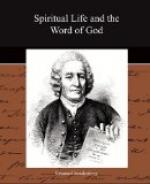But as the world does not know how the words in John (i. 1, 2, 14) that the Lord is the Word, are to be understood, this shall be further explained. It is known in the church that God is good itself and truth itself, and thus that all the good that an angel has and that a man has is from God, and likewise all truth. Now since the Lord is God He is also Divine good and Divine truth; and this is what is meant by “the Word, that was with God, and was God,” and also was “the light that enlighteneth every man,” and that also “became flesh,” that is, Man in the world.
That when the Lord was in the world He was the Divine truth, which is the Word, He Himself teaches in many passages where He calls Himself “the Light,” also where He calls Himself “the Way, the Truth, and the Life”; and where He says that “the Spirit of truth” goes forth from Him. “The Spirit of truth” is the Divine truth. When the Lord was transfigured He represented the Word, “His face that shone as the sun” represented its Divine good; and His garments, which were “bright as the light” and “white as snow,” represented its Divine truth. “Moses and Elijah,” who then talked with the Lord, also signified the Word, “Moses” the historical Word and “Elijah” the prophetic Word. Moreover, all things of the Lord’s passion represented the kind of violence that the Jewish nation offered to the Word. Again, the Lord from Divine truth, which He is, is called “God,” “King,” and “Angel,” and is meant by “the rock in Horeb,” and “the rock” where Peter is spoken of. All this makes clear that the Lord is the Word, because He is Divine truth. The Word in the letter, which is with us, is the Divine truths in outmosts. (A.E., n. 1070.)
As it cannot but transcend the comprehension that the Lord in relation to His Human in the world was the Word, that is, Divine truth; according to these words in John,
“And the Word became flesh, and dwelt among us, and we saw His glory, the glory as of the only begotten of the Father” (i. 14), it shall be explained, as far as possible, to the comprehension. It can be said of every regenerate man that he is his own truth and his own good, since the thought which belongs to his understanding is from truths, and the affection which belongs to his will is from goods. Whether you say, therefore, that a man is his own understanding and his own will, or that a man is his own truth and his own good, it amounts to the same thing. The body is mere obedience; for it speaks that which man thinks from the understanding, and does that which he wills from affection. Thus these things and the body mutually correspond and make one, like an effect and its effecting cause; and these taken together constitute the human.
As it can be said of the regenerate man that he is his own truth and his own good, so it can be said of the Lord as Man, that He is truth itself or Divine truth, and good itself or Divine good. All this makes evident the truth that the Lord in relation to His Human in the world was Divine truth, that is the Word; and that everything that He then said was Divine truth, which is the Word; and that since the time when he went to the Father, that is, became one with the Father, the Divine truth going forth from Him is the Spirit of truth, which goes out and goes forth from Him, and at the same time from the Father in Him. (A.E., n. 1071.)




